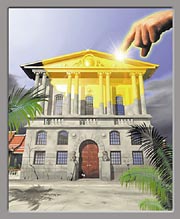
Look At It This Way
Do you think a gallon of gasoline is expensive these days? Noted consumer advocate and all-around good guy Tony DeLorenzo offers a little perspective on the subject:
20-ounce Gatorade @ $1.59 = $10.17/gal.
16-ounce Diet Snapple @ $1.29 = $10.32/gal.
Pint of milk @ $1.59 = $12.72/gal.
9-ounce Evian water @ $1.49 = $21.19/gal.
0.7-ounce Whiteout @ $1.39 = $25.42/gal.
12-ounce STP brake fluid @ $3.15 = $33.60/gal.
1.5-ounce Scope @ $0.99 = $84.48/gal.
4-ounce Pepto Bismol @ $3.85 = $123.20/gal.
6-ounce Nyquil @ $8.35 = $178.13/gal.
DeLorenzo says next time you're grumbling at the pump, just be glad your car doesn't run on Gatorade or Nyquil.
Leave Your Hassles at Home
We hear a lot about the importance of leaving work-related problems at work so they don't infringe on personal and family time. But there's also something to be said about leaving personal problems at home so that we can make the most of our time at work. A major crisis may be difficult to put out of our heads, but most of the things that disturb us tend to be minor annoyances. Our friends at PrintHouse Corp. offer tips to help enhance your performance (and enjoyment) in the work environment by leaving these hassles at home:- Create a "to do" list for your personal life, much as you would for your business. Putting these things down on paper helps get them off your mind. Use the same personal planner or calendar for both your professional and personal scheduling to avoid confusion and conflicts.
- Ask family and friends to keep calls to you at work to a minimum. Of course, you need to be reached in a crisis, and there are plenty of occasions when working parents need to talk to their kids. But many matters can wait until you're able to devote your full attention to them at home.
- See the working day as an opportunity to lose yourself in your work. When we're in the flow of what we're doing, we tend to tune our minor worries that would otherwise nag us.
- Practice present-moment awareness. When your mind tends to drift toward a regret from the past or anxiety of the future, focus back to the present. This invariably is all we have control over anyway, so make the most of it.
- If possible and applicable, use your commute to work as a transition time. This is an ideal time to distance yourself from at-home hassles and energize yourself for the day ahead. This also is applicable on the way home, when it's time to leave work behind.

Get Out Those Sequined Jumpsuits
Or do you plan on doing the earlier tight-black-leather look for Elvis Week (August 10-19)? How 'bout that - Elvis is so cool he gets a 10-day week.Also a little unusual is not having the celebration take place around his birthday. Elvis was born Jan. 8, 1935; most people believe he died Aug. 16, 1977.
And, not surprisingly for this column, you'll now be subjected to some nuggets from our "Elvis Trivia" files.
- Seven percent of Americans think Elvis is alive.
- He flunked an audition for the "Talent Scouts," a popular television show in the '50s.
- For Elvis' 10th birthday, his folks bought him a guitar; he had wanted a bicycle.
- He recorded 18 No. 1 songs. The first was "Heartbreak Hotel" in 1956; the last was "Suspicious Minds" in 1969.
- The last of Elvis' 114 Top 40 hits was "Guitar Man" (No. 28 on the charts), released in 1981.
- The only Grammy Awards Elvis won were for gospel recordings - he won three.
- He appeared in 33 movies.
- Elvis' natural hair color was dark blond.
- The only home in the United States that gets more visitors than Graceland is the White House.
- Lisa Marie Presley was born nine months to the day after Elvis and Pricilla were married.
- His last gig was at Market Square Arena in Indianapolis on June 26, 1977.
- He earned nearly a quarter-billion dollars but had only $4 million at the time of his death, and maintaining Graceland took $250,000 a year. Today, decades after his death, Elvis Presley Enterprises Inc. makes over $50 million each year from licensing the King's image.
Keep an Eye on Your Overhead
Mike Yantis, chief financial officer of a San Antonio-based construction company, tracks overhead closely: "During our region's last downturn, volume decreased while our overhead remained constant, and we didn't know how to lower it."After careful analysis, Yantis notes, "We figured out that not every dollar of overhead cost is the same." Every expenditure for labor, for example, leads to quantifiable, additional expenditures for items such as payroll taxes and benefits. "Now we analyze the related overhead costs for labor - and other items, like materials - with every job we bid on in order to help us figure out where and when to lower overhead," he says.
Yantis also distinguishes between the company's main office (or administrative) overhead and the more variable costs of performing each job. "Based on last year's results," he explains, "we know that 33 percent of our labor costs and 10 percent of material costs are main-office overhead. That helps me figure out our minimum profit margins on any job. If we can't cover main-office overhead, we pass."
Be Careful Handing Out Praise
Positive feedback is an important motivator but give it only when it has been earned, advises management consultant Russell Justice. He warns that gratuitous praise for routine performance can lead subordinates to believe they are doing a better job than they are, and that they deserve rewards for just showing up. It is the opposite of honest feedback and eventually catches up with both the giver and the recipient.
Cozy Up to Your Banker
Build a close relationship with your company's bankers during the good times so they'll be more helpful to the company should difficulties arise. That's the advice we get from William Goodman, a partner with KPMG Peat Marwick LLP in Milwaukee.
Goodman says that, too often, business owners do just the opposite - neglecting bankers until they encounter a financial problem and then go running to the bank desperate for a loan. The likelihood of getting a loan in a time of difficulty is much better when bankers have developed trust in the company's management during good times and believe in the company's ability to resolve problems.
What Makes the Leaders Special?
Our friends at the Hagberg Consulting Group (Foster City, Calif.) explain what they describe as the three pillars of leadership. Where do your strengths lie and in which areas could you improve?Visionary Evangelist - Persuades employees to work toward his or her vision of the future. Creates, sells and drives the strategy of the organization. Serves as the spokesperson for the organization and demonstrates confidence in its potential for success. Takes charge, pushes for action and instills a sense of urgency to achieve the organization's goals.
Team and Consensus Builder - Develops teamwork, commitment, alignment and employee motivation by involving, empowering and creating a positive work environment. Develops loyalty by investing in building relationships with others and by showing interest in employees' needs, growth and career development. Is open to their ideas and willing to share power.
Manager of Execution - Provides organization, focus and clarity of direction to employees. Good administrator. Structured, disciplined and skilled at setting short-term targets and goals. Good at setting priorities and meeting commitments. Sets up systems and processes. Stresses the details. Monitors results, not processes, and provides the rigor and control necessary to stay on course and correct deviations from the plan. Gets results.
Report Abusive Comment